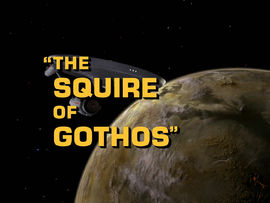Star Trek celebrated its fiftieth anniversary this month. So, here on Redeeming Culture, we’re going to release a short review of every episode of Season One, one episode per day, all month long; for each episode, we’re writing a 3-sentence recap, a 3-word review, and (as much as we can) answering the questions “What fears or hopes are conquered or realized?” and “How does this point to Jesus or to the way God made us?”
For more about Trektember, read our preview post. Please note that there are minor plot spoilers for this episode below.
Today’s episode is number 17: The Squire of Gothos.

Three-sentence Recap
Kirk and Sulu disappear from the bridge in the blink of an eye. The crew search for them on an uninhabitable planet, but find an Earthlike atmosphere with an Earthtlike castle instead of the volcanic wasteland they were expecting. And the one behind both of these feats is Trelane, a nearly-omnipotent being who is, to put it frankly, an Earth wars fanboy.
Three-word Review
Proto-Q* delights, mystifies.
Big Sci-Fi Concepts
- Like Where No Man Has Gone Before and Charlie X before it, and prefiguring The Next Generation’s Q, The Squire of Gothos gives Kirk a nearly-omnipotent being to overcome or outmaneuver. Unlike those episodes, Trelane’s true nature is not revealed until the end of the episode in an almost-literal Deus Ex Machina that still somehow manages to work.
- Humans forced to perform for a capricious being of great power is not strictly science fiction-dependent, but it often finds its most full exploration in this medium.
Fears Conquered/Hopes Realized
- The crew faces the fear of their dark, warlike past as Trelane exults in Earth’s ancient violence, and through the lens of history (albeit distorted by Trelane) they see a very dangerous race indeed.
- Kirk fears the loss of his agency and control in the face of Trelane, who can not only hold Kirk back, but can take control of the Enterprise herself.
What does this episode tell us about God or about man?
We’ve talked before about how a god with a childish nature is not worth worshipping. Spock would seem to agree, and in fact his experiences with Gary Mitchell and Charlie Evans seem to have soured him significantly on the concept of an all-powerful but capricious being. “I object to you,” he says. “I object to intellect without discipline. I object to power without constructive purpose.” But as Kirk and Spock soon discover, while his power and intellect are prodigious, they are not infinite.
During a discussion, Spock points out without surprise that Trelane doesn’t know everything. And there, Kirk hits on a realization. “If he’s fallible, he can’t be all-powerful, which means he has something helping him.”
Therein lies a great truth about God.
The Bible is clear about God’s omniscience (He knows everything) and His omnipotence (He can do everything). And those two, while seemingly unrelated, are crucial parts of God’s nature**.
Still, with omniscience and omnipotence, it would still be possible to get a cruel and capricious god like Trelane. That wouldn’t be worth worshipping. And would be undefeatable. That’s why we need a third core attribute to have a God worth worshipping, the God we see in the Bible.
That crucial element is God’s omnibenevolence (His perfect love).
God’s perfect love tempers His perfect knowledge and compels His perfect power. His perfect knowledge informs His perfect love and directs His perfect power. His perfect power gives weight to His perfect love and validates His perfect knowledge.
Trelane has none of these things.
The episode begins with discussion of a mirage in the desert; as it turns out, that’s what Trelane is. Without omniscience, omnipotence, and perfect love, Trelane (and any other god) is nothing but a petulant schoolboy. Praise God that He is not.
• • •
*Remember, hyphenated words count as a single word.
**It may not seem like Romans 1:20 talks about God’s omniscience, but I would argue (based on the context in verse 19 which includes truth and knowledge being given to man) that part of God’s divine nature includes being all-knowing. That is only my opinion, though, and if you can make an argument contradicting it, I welcome it; please post it below.
Thank you for reading Redeeming Culture! Come back tomorrow for more Trektember as we look at episode 18 of Star Trek: the well-known classic “Arena”.


